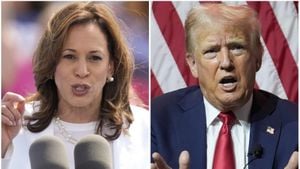The upcoming U.S. presidential election is shaping up to be not just about policy positions but also about market sentiment—specifically, how the stock market reacts based on who is leading the race. With just days left until voters head to the polls, the stakes have never been higher for candidates, investors, and everyday citizens alike. One of the latest narratives making waves focuses on how election outcomes and financial markets might impact each other, particularly as prediction markets indicate shifts toward certain candidates.
Recently, prediction markets like Polymarket and Kalshi have sparked discussions about their role as indicators of public sentiment leading up to the election. For many, these markets may seem like mere betting platforms, but they have become significant arenas for gauging the electoral climate. According to Polymarket, former President Donald Trump holds around a 60% probability of winning, even as his lead has seen fluctuations. This is down from about 67% just the week prior, hinting at potential volatility before the election rolls around. Conversely, Vice President Kamala Harris, who has seen varying fortunes on these platforms, experienced some recent momentum, adding complexity to the assignment of probabilities.
Despite their ups and downs, these prediction markets have demonstrated notable accuracy over time. They provide insight not only about potential outcomes but also about the broader economic sentiment as seen through the lens of market behavior. For example, investors have been placing and modifying their bets on various platforms, reflecting confidence and shifting narratives around what might transpire come election day.
A close look at the numbers reveals some historical precedents worth mentioning. The S&P 500 has usually managed to advance or remain stable before presidential elections, which historically correlates with the incumbent party's chances of remaining in power. A recent analysis by Sam Stovall from CFRA Research indicates this correlation has held true 82% of the time based on elections since 1944. The implication is clear: If the market is trending upward, it often suggests confidence in the current administration’s economic policies, boosting their reelection prospects.
While general sentiment favors Trump as of late, it’s important to highlight other factors contributing to market reactions. For one, investor sentiment has fluctuated based on economic indicators, inflation rates, and projections around federal policies. With inflation trending downwards and growth indicators showing promise, many are optimistic about the market regardless of who wins the election. This has led financial advisors to caution against making drastic investment changes based solely on electoral outcomes.
Financial analysts are also noting how sectors have performed under different administrations, adding another layer of complexity to the election-market discourse. For example, when Trump came to power, there was substantial betting on energy stocks, just as there was betting on renewable sectors during Biden’s administration. Both instances led to unexpected results, showcasing the unpredictability of the market relative to presidential policies.
Polling data continues to play its part, though it presents its own set of challenges. Political polling has come under scrutiny, with many analysts pointing out discrepancies between polling data and actual election outcomes. Just as previous elections witnessed major surprises, the same could feasibly happen on November 8th.
Simultaneously, volatility has reigned on Wall Street as the results of the election inch closer. Investors are particularly on edge when prediction markets indicate shifts, as big bets made by others can swing the odds significantly. For example, last weekend saw Trump's prediction odds slip off slightly, leading to waves of investors cashing out of their bets. Similar patterns played out during the 2016 election when Hillary Clinton's odds looked favorable only to be upended by election results.
Looking back, the reality is this: markets react not just based on who may win or lose the election but also based on underlying sentiments surrounding the economic policies linked to each candidate. Many advisors are warning against overreacting to market movements as part of this election-related noise. They highlight historical contexts showing how markets have often maintained upward trends, regardless of who the president is. The S&P 500's performance decades prior shows there is little consistency to directly link presidential parties with market booms or busts.
All these factors mean the upcoming election is more than just candidates and speeches; it's about people’s economic futures. Stakeholders are becoming increasingly aware of how the candidates’ platforms might affect market dynamics. Traders and investors, often heavily leveraged, are keeping close tabs on prediction markets. Maintaining steady nerves may be the best course of action as investors await clarity on the electoral picture.
Interestingly, one prominent financial advisor underscored the importance of maintaining focus on the fundamentals, irrespective of who sits behind the Resolute Desk after the election. Regardless of party lines and promises, market drives come fundamentally down to economic performance over time, stock earnings, and overall financial health rather than solely political outcomes.
Looking over the broader horizon, analysts warn against viewing markets as binary options tied explicitly to party performance. The narrative suggests voters and investors alike should breathe easy; at the end of the day, economic indicators may be the strongest compass guiding market movements rather than fluctuated predictions around political outcomes.
So, as Americans prepare to cast their votes, one can’t help but wonder: how much of the election will actually depend on prediction markets, and how much will it come down to the economic fabric of the nation? The days leading up to November 8th promise to be interesting, with both Trump and Harris firmly entrenched, battling for not just voters' hearts but also investor sentiments. Therefore, as the votes are counted and eventual winners emerge, it will also be time to watch how the market reacts, proving once again the close-knit relationship between politics and economy.



